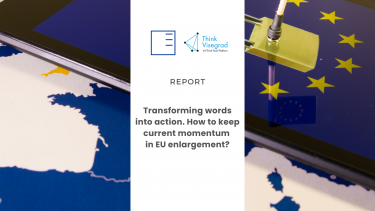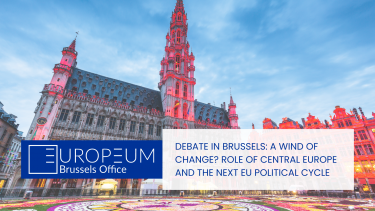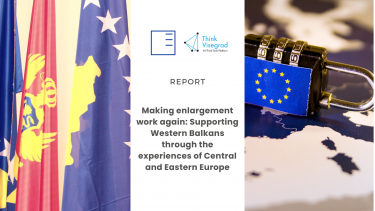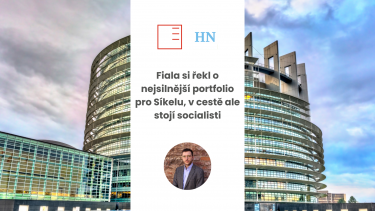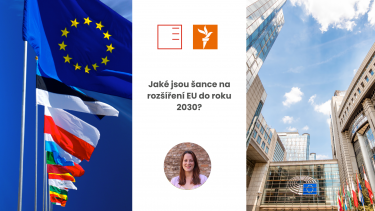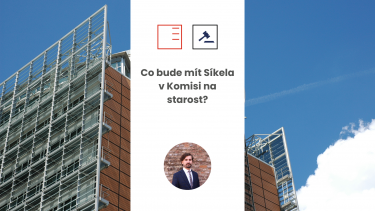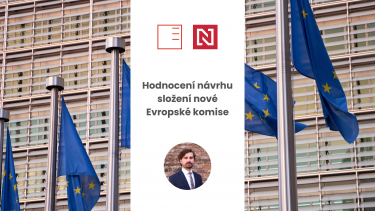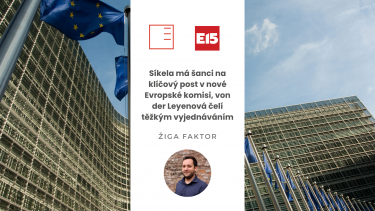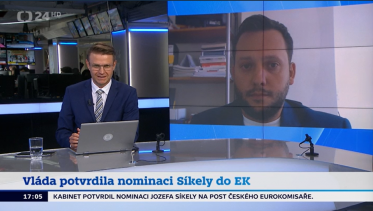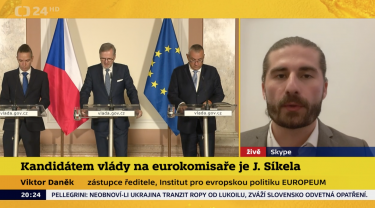Report | Transforming words into action. How to keep current momentum in EU enlargement?
On the 3rd of October, Think Visegrad in Brussels, represented by the Brussels Office of EUROPEUM Institute for European Policy, organized a discussion titled "Transforming words into action. How to keep current momentum in EU enlargement?". Experts from think tanks, diplomatic missions and EU institutions dwelled into the renewed focus on EU enlargement, including the initiation of accession negotiations with Ukraine and Moldova, the formulation of new strategies and financial incentives for candidate states, and reinforced commitments from the EU. The key challenge moving forward is ensuring that this momentum is sustained and translated into concrete, transformative actions that deliver measurable results.
Show more
Debate in Brussels | A wind of change? Role of Central Europe and the next EU political cycle
As the dust settles after a hectic period of post-election negotiations, Von der Leyen’s second Commission is faced with serious economic challenges. Recent reports of Draghi and Letta have clearly indicated that the EU is lagging behind other global powers in the areas of growth and competitiveness and this is reflected in the composition of the College as well as within strategic priorities for the next political cycle. Come listen and debate about challenges EU is facing!
Show more
Report | Making enlargement work again: Supporting Western Balkans through the experiences of Central and Eastern Europe
On September 12th, EUROPEUM’s Brussels Office organized a public conference titled “Making enlargement work again: Supporting Western Balkans through the experiences of Central and Eastern Europe”. Following a keynote speech by H.E. Bálint Ódor, the panel discussions dwelled on the 2004 enlargement, its impacts on the EU and the lessons learned from the process through the perspective of current EU accession of the countries of Western Balkans.
Show more
Hospodářské noviny | Fiala asked for the strongest portfolio for Síkela, but the Socialists are in the way
Petr, business or defense? This was the question posed to Prime Minister Petr Fiala by European Commission President Ursula von der Leyen. Fiala replied that he wanted trade. Filip Křenek, an analyst at EUROPEUM Institute, commented for Hospodářské noviny.
Show more
Radio Slobodna Evropa | What are the chances of EU enlargement by 2030?
The prospect of EU enlargement by the end of the mandate of the future European Commission looks more optimistic than at any time in the last decade. And barring the full membership of one new state, it is realistic to expect that at least one country will have concluded membership negotiations by the end of this decade and is just waiting for an acceptance date. Jana Juzová, a senior research fellow at EUROPEUM Institute, commented for Radio Slobodna Evropa.
Show moreČeská justice | What will Síkela be responsible for in the Commission?
Disappointment with the negotiations and the weak position of the Czech Republic was voiced when the new composition of the European Commission was announced. The presentation of the post to the Czech nominee Jozef Síkela is accompanied by a debate on how influential the position of Commissioner for International Partnerships is. Experts say that although the government had bigger expectations, much can be achieved even with the portfolio at hand. The current Trade and Industry Minister could help the EU to be a counterweight to Russian and Chinese influence in emerging economies, and could also push for greater raw material security. For daily Česká justice commented Viktor Daněk, Deputy Director of EUROPEUM Institute.
Show moreDenik N | Assessment of the new composition of the European Commission
The President of the European Commission, Ursula von der Leyen, announced the composition of the new European Commission. This brings to an end weeks of negotiations and speculation. In addition to the new Commissioners, she also presented the Executive Vice-Presidents and Vice-Presidents of the EC - more women than men. Viktor Daněk, deputy director of EUROPEUM Institute, commented for Deník N.
Show moree15 | Síkela has a chance at a key position in the new European Commission, von der Leyen faces tough negotiations
Intense behind-the-scenes negotiations are currently underway in Brussels over the allocation of 27 positions in the new European Commission, which will once again be led by Ursula von der Leyen. The German politician faces two major challenges: the limited number of strong economic portfolios, which many member states, including the Czech Republic, are vying for, and the effort to create the first-ever gender-balanced Commission, complicated by the predominance of male candidates. The situation was commented on for e15 by Žiga Faktor, Deputy Director of EUROPEUM Institute.
Show more
ČT24 | The government confirmed the nomination of Jozef Síkela to the European Commission
Czech government has confirmed the nomination of Minister of Industry and Trade Jozef Síkela for the position of Czech EU Commissioner at its meeting. How will the appointment process continue? And what are Síkela's chances of securing a significant portfolio in the European Commission? Žiga Faktor, Deputy Director of EUROPEUM Institute, answers on ČT24 broadcast.
Show more
ČT24 | The Czech candidate for European Commissioner is Jozef Síkela
Jozef Síkela has been nominated by the Czech government for the position of European Commissioner. What was crucial for the decision? And why was Danuše Nerudová not nominated, even though Ursula von der Leyen requires both a female and male candidate? What is the timeline now? Viktor Daněk, Deputy Director of EUROPEUM Institute, answers these and other questions for ČT24.
Show moreStaroměstské náměstí 4/1
Prague 1 - Staré Město
110 00
tel.: +420 212 246 552
email: europeum@europeum.org
https://www.europeum.org
